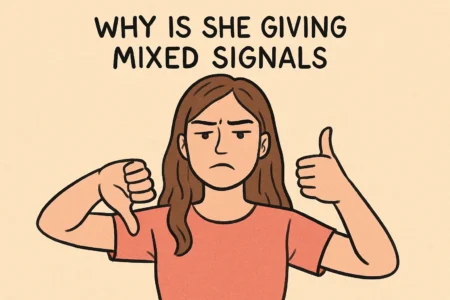It doesn’t start with a siren. It starts with a whisper. A knot in your gut during a tense dinner. A flash of confusion when a story you told gets twisted into something you barely recognize. You tell yourself to brush it off. Every couple fights, right? You focus on the good times—the laughter, the connection, the woman you fell for. But the whisper doesn’t fade. It grows into a low, constant hum of anxiety that follows you everywhere. Eventually, that hum becomes a question you can no longer ignore, the one that probably led you here about: red flags men should not ignore?
As a woman, I’ve seen the beautiful and brutal complexities of relationships from a front-row seat. I’ve seen it in my own life and in the lives of the men I care about most—my friends, my brother, my father. I have watched good, strong, confident men get hollowed out, their light dimmed by a partnership that takes far more than it gives. Society has a script for men: be the provider, be the rock, be tough. That script makes it incredibly difficult to recognize, let alone admit, that the person you’re trying to shelter is actually the storm.
Admitting something is profoundly wrong feels like a personal failure.
It’s not.
It’s an act of courage. This isn’t about blaming her. It’s about turning on the lights in a room you’ve been navigating by feel for far too long. It’s about finally giving a name to the patterns that have been costing you your peace of mind.
More in Relationship Health Category
Key Takeaways
- Toxicity Isn’t One Bad Fight; It’s the Whole Movie: Bad days happen. A toxic relationship is a recurring pattern, a predictable script of harmful behavior that always leaves you feeling drained, devalued, and insecure.
- “Care” Is Often a Mask for Control: Constant texts, monitoring your friends, and dictating your choices are not signs of love. They are the tools of control, plain and simple.
- Your Gut Is Your Best Bullshit Detector. Trust It: Gaslighting is a mind game designed to make you think you’re the crazy one. If you constantly feel confused or anxious, listen to that feeling. It’s the most honest voice in the room.
- A Partner Is a Teammate, Not a Daily Critic: Your partner should be your biggest fan. If she’s constantly belittling your ambitions, mocking your passions, or chipping away at your confidence, she isn’t building you up; she’s tearing you down.
- You Can’t Fix Them. Your Only Job Is to Save Yourself: Recognizing the problem is the first step. But the second is realizing you cannot single-handedly change another person. Your primary responsibility is to your own well-being.
Does It Feel Like You’re Always Walking on Eggshells?
One of the first and clearest signs is a constant, low-grade tension you can’t seem to shake. It’s that feeling of holding your breath, waiting for something to go wrong. Your home should be your sanctuary, the one place on earth you can let your guard down. But in a toxic dynamic, that sanctuary becomes a minefield. You start choosing your words carefully. You constantly scan her mood, trying to defuse a bomb before it goes off. This isn’t normal relationship stress. This is pure exhaustion.
I watched it happen to a good friend, Mark. He was one of those guys who lit up a room. But when his girlfriend was there, it was like watching a light switch get flipped off inside him. He’d be mid-story, catch her expression, and just… stop. The energy would drain out of him. Peace in his own home wasn’t a given; it was a prize he had to earn with perfect behavior, and the effort was visibly breaking him.
Does Every Minor Issue Explode Into a Major Crisis?
Healthy couples have disagreements. What they don’t do is turn a molehill into a mushroom cloud. In a toxic relationship, there’s no sense of proportion. Forgetting an item at the grocery store isn’t a simple mistake; it’s proof that you’re selfish and never listen. Having a different opinion on a movie isn’t just a matter of taste; it’s a personal attack on her judgment.
These over-the-top reactions serve a purpose: they condition you to stop disagreeing. The emotional cost of voicing your own perspective becomes so high that it feels safer to just go along with things. You learn that your silence is the price of a quiet house. A partnership is about navigating differences with respect, not turning them into battles for control. If every small bump feels like a five-alarm fire, you’re not in a relationship. You’re in a crisis zone.
Do You Censor Yourself Just to Keep the Peace?
Think about how you talk when you’re with your buddies. Relaxed? Open? Now, compare that to how you talk with your partner. Do you run your thoughts through a filter before you speak? Maybe you downplay a win at work because you know she’ll find a way to pop your balloon. Perhaps you swallow a concern because you can already predict the Oscar-worthy performance of tears or rage it will provoke.
This self-censorship is your gut screaming a warning. It’s your brain trying to protect you from an emotional injury you know is coming. When you can no longer share what you really think and feel with the person closest to you, the relationship has stopped being a source of support. It has become a performance. You’re just playing a role to avoid a fight. That’s not living.
Is She Your Harshest Critic Instead of Your Biggest Fan?
Your relationship should be your safe harbor, not the storm. It’s where you should feel seen and supported. In a toxic relationship, that dynamic gets flipped. Your partner becomes your number one critic. Praise is a drought, but criticism is a constant, dripping faucet that wears away at the stone of your confidence. You can start to believe that her critical voice is the truth. It’s a quiet but lethal form of emotional damage.
Are Her “Jokes” Just Insults in Disguise?
“God, learn to take a joke.” “Stop being so sensitive.” If you hear these phrases a lot, you’re not being overly sensitive. There’s a vast difference between playful teasing and mean-spirited jabs disguised as humor. These “jokes” are often precision-guided missiles aimed directly at your insecurities—your job, your hairline, your family.
Worse, they’re often lobbed in front of others to maximize the sting. It’s a way to put you down while maintaining plausible deniability. It’s a trap. If you object, you’re the guy with no sense of humor. If you stay silent, you swallow the poison. It’s a power play, pure and simple. Humor should be a bridge that connects you, not a weapon one person uses against the other.
Does She Pour Cold Water on Your Passions?
You walk in the door, buzzing. You landed a huge client. You finally fixed that engine. You’re looking for a high-five, and instead, you get a shrug. Or a skeptical question that kills your excitement on the spot. “Are you sure you can handle that?” “Well, I guess that means I’ll be seeing even less of you.”
To a toxic partner, your success can feel like a threat. Your growth can highlight their own feelings of being stuck. So, they try to shrink you back down. They’ll call your hobbies “childish” or your ambitions “unrealistic.” A good partner wants you to have a full and vibrant life. A toxic one wants to be your entire world.
Who Is Really in Control Here?
Control is a poison that often tastes sweet at first. “I only text you so much because I miss you.” “I just don’t like your friend Mike; he’s not good for you.” These statements can sound like they come from a place of love. Often, they don’t. They are tools for isolation and surveillance. Real love is built on trust and encourages your independence. Control seeks to shrink your world until your partner is the only thing left in it.
Does Your Social Calendar Need Her Stamp of Approval?
Do you hesitate before making plans with your friends? Not just checking your schedule, but running a quick, complex calculation of her potential reaction? A controlling partner makes your social life emotionally expensive. A guys’ night out might mean a week of passive-aggressive comments before and a weekend of the silent treatment after.
I once dated a man who was a master of this. He never said, “You can’t go.” Instead, he’d get quiet and sad, sighing about how lonely he was going to be. The guilt was suffocating. Eventually, it just felt easier not to make plans. He made the emotional price of having my own life too high. If you have to emotionally brace for impact just to see your friends, you’re not in a healthy partnership.
Does She Demand to See Your Phone?
This is a hard line. There are no blurry edges here. A demand to read your texts, emails, or DMs is not a reasonable request. It is a profound violation of privacy and a screaming declaration that she does not trust you. She might use her own insecurities as a justification, but your right to a private inner world is not something you sacrifice to manage her anxiety.
Trust is the foundation. When one partner feels entitled to play detective, that foundation has already crumbled. It creates a dynamic of guard and prisoner, where you’re terrified of an innocent chat being twisted into a guilty verdict. A partner who trusts you doesn’t need to check your work. A partner who needs to check will never trust you, no matter what they find.
Have You Become the Designated Scapegoat?
In a toxic relationship, accountability is the last thing on the menu. A deeply insecure person often has an ego so fragile that they cannot admit fault. To protect themselves, they become masters of deflection. Everything that goes wrong—in their day, in their life, in your relationship—must be someone else’s fault. Since you’re the closest person, you become the primary target.
This is a defense mechanism called projection. They are offloading their own failures and insecurities onto you. After a while, it’s incredibly disorienting. You might even find yourself apologizing for things that weren’t your fault, just to restore the peace.
Is Every Problem in the Relationship Magically Your Fault?
She had a bad day, and it’s your fault for not being supportive enough. She’s unhappy, and it’s your fault for not living up to her expectations. The relationship is struggling, and it’s entirely on you because you’re emotionally distant, or you work too much, or you don’t listen. See the pattern?
This is a classic move to avoid ever having to look in the mirror. By making you the source of all problems, she absolves herself of any need to change. It also gives her all the power. If you’re the problem, it’s up to you to fix it. A healthy partnership involves two people capable of saying, “That was my fault. I’m sorry.” As experts at the University of Washington’s health center explain, healthy relationships rely on mutual respect and shared responsibility, not one-sided blame.
Does She Use Your Vulnerabilities as Ammunition?
This is a low blow. At some point, in a moment of trust, you shared something vulnerable—a fear, a past failure, an insecurity. In a healthy relationship, that confidence is held sacred. In a toxic one, it’s stored away as ammunition for a future fight.
Then, in the heat of an argument, she brings it up. She makes a cutting remark designed to hit you exactly where you’re most exposed. This is a calculated, cruel tactic. It’s about winning at all costs, even if it means destroying the trust that holds a relationship together. Someone who loves you does not weaponize your pain.
Is This Emotional Rollercoaster Leaving You Drained?
Life with a toxic partner is fundamentally unstable. It’s a dizzying, exhausting ride of incredible highs and soul-crushing lows, and you never know which version of her you’re going to get. This isn’t passion; it’s chaos. The cycle is also powerfully addictive. The good times feel so good they give you just enough hope to endure the bad, keeping you stuck on the ride.
Are the Highs Ecstatic and the Lows Crushing?
The pattern is brutally predictable. Tension builds. A massive fight erupts over something insignificant. Cruel, damaging things are said. You feel broken. Then, a day or two later, she is flooded with remorse. She’s incredibly loving, sorry, and affectionate, promising it will never happen again. This is the honeymoon phase. The relief is so intense that you cling to it. You believe the promise because you desperately want to.
But the tension always returns. The cycle repeats. This violent swing between being put on a pedestal and being thrown in the gutter forges a powerful trauma bond. You’re not addicted to her; you’re addicted to the rollercoaster of the cycle itself.
Is Affection Something You Have to Earn?
In a healthy relationship, affection is the baseline. It’s the air you breathe. In a toxic one, affection is currency. It’s given as a reward for good behavior and withheld as punishment when you step out of line. Your relationship becomes a job where you are constantly performing to earn basic kindness. The silent treatment is a primary tool for this. When she’s displeased, she ices you out, withdrawing all warmth and communication for hours or even days. This is a form of emotional abuse, designed to make you so starved for connection that you’ll do anything to get it back—including abandoning your own needs.
What Happens When You Try to Draw a Line?
Boundaries are simply the rules of engagement that protect your well-being. They’re vital. A boundary can be as simple as, “Please don’t talk to me like that,” or “I need some quiet time tonight.” How your partner reacts to these simple statements tells you everything. A healthy partner respects your boundary, even if they don’t like it. A toxic partner treats your boundary as a declaration of war.
Does Saying “No” Feel Like Starting a Fight?
Men are often taught to be fixers, to be agreeable. A toxic partner exploits this. Any attempt to draw a line in the sand is met with a tidal wave of resistance. She might get angry and call you selfish. She might start crying and make you feel guilty. Or she might just ignore you and do what she wants anyway. When your limits are constantly violated, you learn a dangerous lesson: your needs don’t matter. You learn that it’s just less painful to give in. If saying “no” feels like you’re preparing for battle, you’re in an unhealthy place.
Do You Get Punished for Needing Space?
Everyone needs alone time. It’s not a rejection; it’s a basic human need to recharge. In a toxic relationship, your need for space is often twisted into an attack on her. She might take it as proof you don’t love her, becoming clingy or demanding to know what you’re doing. This creates a suffocating environment where you feel you have no room to breathe. The constant pressure doesn’t feel like intimacy; it feels like a prison cell.
Are You Looking in the Mirror and Not Recognizing the Guy Staring Back?
This is the end result. The final, quiet tragedy of a long-term toxic relationship. The constant stress, criticism, and mind games take their toll. Piece by piece, you lose the person you were. Your friends might say you’ve changed. You might catch your own reflection and see a tired, anxious stranger. This isn’t just getting older. This is the erosion of your self.
Where Did Your Friends and Hobbies Go?
Think back to your life before this relationship. What did you love to do? Who did you spend your time with? Now, where are they? It happens so gradually you barely notice. The weekly game of poker started too many fights, so you stopped. She made fun of your love for fishing, so you stopped. This is the result of a subtle campaign of isolation. By cutting you off from the people and passions that define you, a toxic partner makes you more dependent on them. Ask yourself:
- When was the last time I saw my friends and didn’t feel a knot of guilt in my stomach?
- Are my most important friendships a shadow of what they used to be?
- Do I feel free to be my authentic self, or am I playing a part?
- Do I even remember who I was before all this?
Is Your Self-Esteem at Rock Bottom?
You used to be confident. You trusted your own mind. Now, you second-guess every decision. You feel like you can’t do anything right. A dark thought might even slither in: you’re lucky she puts up with you, because who else would?
This is the endgame. This is what all the criticism and manipulation is for: to dismantle your self-worth so you feel too broken to leave. That feeling of worthlessness is the cage. But it is a lie. It is not the truth of who you are; it is a reflection of the toxic air you’ve been breathing.
Seeing these signs is a painful moment of clarity. This is not you failing. This is you finally listening to your own pain. It is the part of you that is still fighting, the part that knows you deserve better. You deserve peace. You deserve respect. You deserve to feel like yourself again. Trusting that part of you is the bravest thing you can possibly do.
FAQ – Red Flags Men Should Not Ignore
What are the signs of a toxic relationship?
Signs of a toxic relationship include constant tension, over-the-top reactions to minor issues, self-censorship, being criticized instead of supported, control issues, emotional manipulation, and a cycle of highs and lows that drain your energy.
How can I tell if I am walking on eggshells around my partner?
If you feel a persistent, low-grade tension, have to choose your words carefully, or avoid expressing your true feelings to prevent conflict, you might be walking on eggshells, which indicates a toxic dynamic.
What does it mean if my partner dismisses my passions or successes?
Dismissing your passions or success can be a sign of a toxic relationship where your growth is seen as a threat, and your partner may be trying to diminish your achievements to control or undermine you.
How does control manifest in toxic relationships?
Control in toxic relationships manifests through behaviors like monitoring your social interactions, demanding access to your phone, isolating you from friends, and making your social calendar conditional on her approval.
What should I do if I recognize these signs in my relationship?
If you recognize these signs, it is important to prioritize your well-being, consider seeking support from trusted friends or a professional counselor, and remember that boundaries and respect are essential for healthy relationships.





